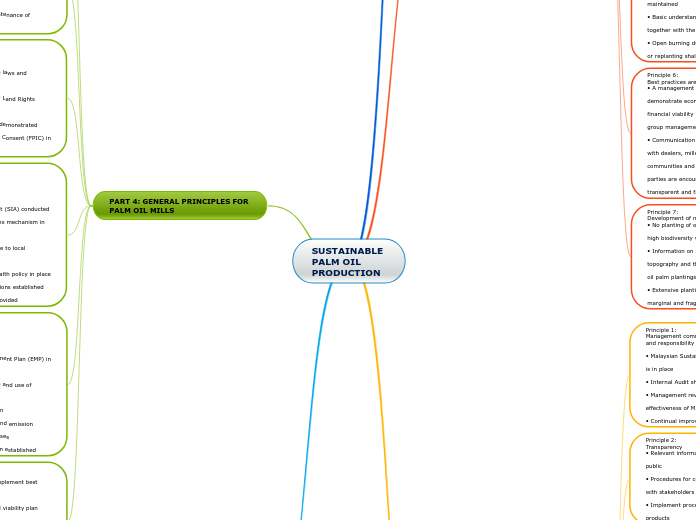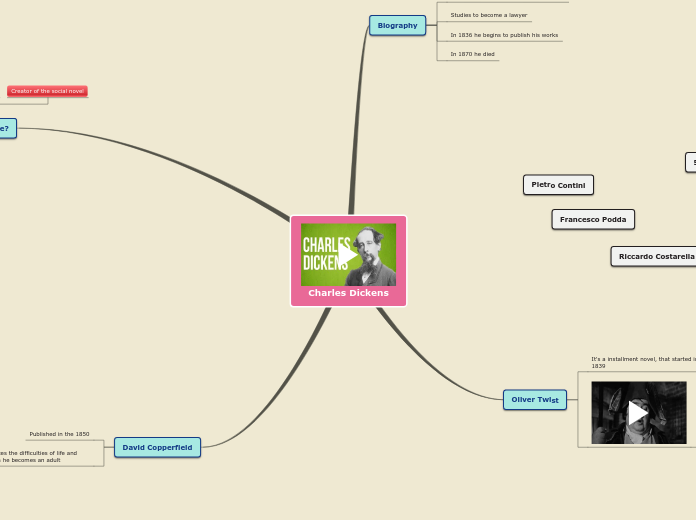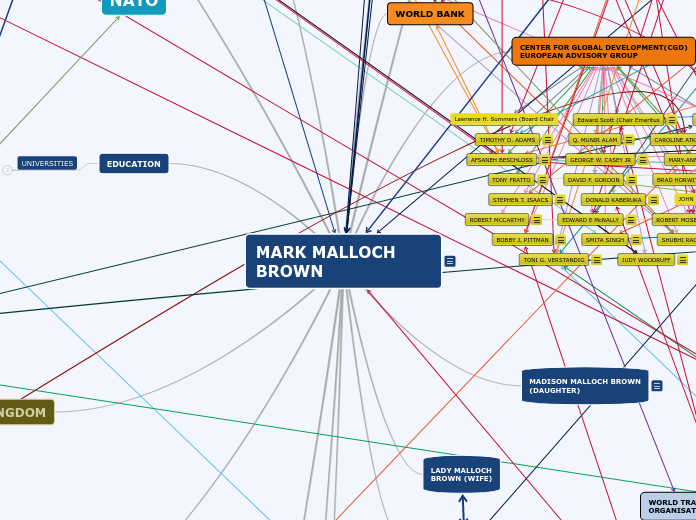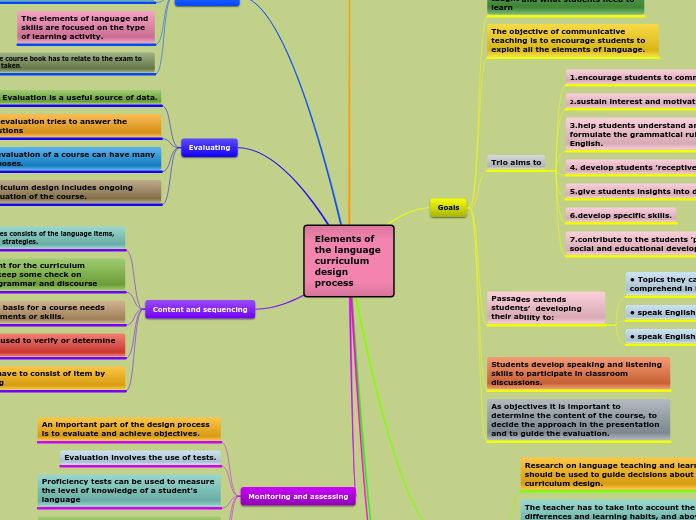SUSTAINABLE
PALM OIL
PRODUCTION
Type in the name of the company you are going to have an interview with.
CHALLENGES OF MSPO
How ambitious are you?
Limited incentives for companies to embrace
sustainability certification.
Uptake of MSPO certification has been rather gradual
without mandatory.
Where and how do you see yourself in 5 years time?
Type in the answers.
Existence of other palm rated sustainability standards
What are your long-term goals ?
Type them in.
Recognition and acceptance of MSPO Scheme,
particularly in environmentally sensitive markets for
Malaysian palm oil products (EU, US, Australia).
What are your short-term goals ?
Type them in.
PART 4: GENERAL PRINCIPLES FOR
PALM OIL MILLS
Do you fully understand what this position implies?
After you've made some research on the company, read the job description thoroughly, and try to fully understand what your responsibilities will be.
Principle 6:
Best Practices
• Mill management to implement best
practices
• Economic and financial viability plan
implemented
• Transparent and fair price dealing
implemented
• Contractors shall understand and comply
with MSPO requirements
Principle 5:
Environment, Natural
Resources, Biodiversity
and Ecosystem Services
• Environmental Management Plan (EMP) in
place
• Efficiency of energy use and use of
renewable energy
• Waste management plan
• Reduction of pollution and emission
including greenhouse gasses
• Water management plan established
Principle 4:
Social Responsibility,
Health, Safety and
Employment Conditions
• Social Impact Assessment (SIA) conducted
• Complaints and grievances mechanism in
place
• Commitment to contribute to local
sustainable development
• Employees safety and health policy in place
• Good employment conditions established
• Appropriate training is provided
Principle 3:
Compliance to Legal
Requirements
• Compliance to applicable laws and
regulations
• Land use and Customary Land Rights
respected
• Legal ownership of land demonstrated
• Free, Prior and Informed Consent (FPIC) in
place
What would you do on the first day?
What about the first week(s)? Fill in some of the actions that you are planning to take.
Principle 2:
Transparency
• Transparency of information and documents
relevant to MSPO requirements
• Transparency in communication and
consultation
• Implementation and maintenance of
Traceability requirements
What do you think the main challenges will be?
Type them in.
Principle 1:
Management Commitment and
Responsibility
• Malaysian Sustainable Palm Oil (MSPO)
Policy is in place
• Internal Audit shall be conducted periodically
• Management review to ensure adequacy and
effectiveness of MSPO implementation
• Continual improvement plan in place
What will be your main tasks?
Type them in.
PART 3: GENERAL PRINCIPLES FOR
OIL PALM PLANTATION AND
ORGANISED SMALLHOLDER
Principle 7:
Development of new planting
• No planting on lands with high
biodiversity value
• No conversion of Environmentally
Sensitive Areas (ESAs)
• New plantings and replanting on peat
lands can be developed as per MPOB
guidelines & industry best practices
• Comprehensive Social and
Environmental Impact Assessment
(SEIA) conducted prior to new plantings
• Adequate information on soil types and
topography needed of new plantings
• Extensive planting on steep areas and
fragile soils avoided
• Recognize customary land rights
and land owners’ through Free, Prior
and Informed Consent (FPIC)
Principle 6:
Best practices
• Site management to implement best practices
• Economic and financial viability plan
implemented
• Transparent and fair price dealing implemented
• Contractors shall understand and comply with
MSPO requirements
Principle 5:
Environment, natural
resources, biodiversity
and ecosystem services
• Environmental Management Plan (EMP) in place
• Efficiency of energy use and use of renewable
energy
• Reduction of pollution and emission including
greenhouse gases
• Water management plan to maintain the quality
and availability of water resources
• Identification of high biodiversity value areas
and rare, threatened or endangered ecosystems
or species
• Zero burning practices for waste disposal and
land preparation
Principle 4:
Social responsibility, health,
safety and employment
conditions
• Social Impact Assessment (SIA)
conducted
• Complaints and grievances mechanism
in place
• Commitment to contribute to local
sustainable development
• Employees safety and health policy in
place
• Good employment conditions established
• Appropriate training is provided
Principle 3:
compliance to legal
requirements
• Compliance with applicable laws and
regulations
• Land use and Customary Land Rights
shall be respected
• Legal ownership of land demonstrated
• Free, Prior and Informed Consent (FPIC)
in place
Principle 2:
Transparency
• Relevant information and documents made
public
• Procedures for consultation and communication
with stakeholders established
• Implement procedures for traceability of
products
How would you describe yourself?
Type in a short description.
Principle 1:
Management commitment
and responsibility
• Malaysian Sustainable Palm Oil (MSPO) Policy
is in place
• Internal Audit shall be conducted periodically
• Management review to ensure adequacy and
effectiveness of MSPO implementation
• Continual improvement plan in place
What are your hobbies?
What do you like to do in your free time? What was the last film you saw or the last book you read? Think of the activities that relax you the most. Fill in several hobbies.
PART 2: GENERAL PRINCIPLES FOR
INDEPENDENT SMALLHOLDER
Are you qualified for this position?
Interviewers will want to know whether or not you are able to do the job.
Answer the questions from this section and see if you are the right person for this position.
Principle 7:
Development of new planting
• No planting of oil palm on land with
high biodiversity value
• Information on soil types,
topography and their suitability for
oil palm plantings is obtained
• Extensive planting on steep terrain,
marginal and fragile soils is avoided
Principle 6:
Best practices are implemented
• A management plan to
demonstrate economic and
financial viability is established by
group management
• Communication and consultation
with dealers, millers, local
communities and other interested
parties are encouraged for
transparent and fair price dealings
Principle 5:
Environment, natural resources,
biodiversity and ecosystem
services
• Awareness of environmental impacts is expected
• Use of renewable energy is applied, where possible
• All waste products and souse of pollution are identified
by off appropriately small holders must be disposed
• Quality and availability of surface and ground water are
maintained
• Basic understanding of any species or habitat of concern,
together with the conservation needs, is shown
• Open burning during land preparation for oil palm cultivation
or replanting shall not be practiced
What is the most compelling reason you should be hired?
Principle 4:
Social responsibility, health,
safety and employment
conditions
• Complaints and grievances raised are responded to
• Safe work practices and conditions are ensured
• Work conditions are in accordance with mutual verbal
agreements made transparently and freely
• Equal opportunity and treatment are provided
• Where available and practical, living quarters with basic
amenities are provided
• Children and young persons are not employed or exploited
• Workers pay and employment conditions meet legal standards
• Seeking knowledge to increase competency in oil palm
management is encouraged
What can you do for this job that other candidates can't? Why?
Principle 3:
Compliance to legal requirements
• All applicable local, state, national & ratified
international laws and regulations are complied
with
• Land use and customary land rights of
independent smallholders are demonstrated
• Legal ownership of customary land rights is
demonstrated using maps
Which qualities were easily observed by your colleagues and/or your former/existing boss?
Type them in.
Principle 2:
Transparency
• Records of sales and delivery or transportation of
fresh fruit bunches (FFB) are kept
• Traceability requirements are implemented and
conducted by group management
What are your weaknesses?
Examples:
stubbornoverly critical, can't accept authoritytoo demandingtoo talkativetoo quiettoo sensitivelacking assertivenesslacking social tact
Principle 1:
Management commitment and responsibility
• Policy binding smallholders to MSPO is in place
• Action plan for continual improvement of SPOCs*
is in place
What strengths qualify you for this job?
Example:
ambitiousgood communicatorfocuseddeterminedadaptablecuriousoptimisthard workerhonestpoliteco-operativeself motivatedenthusiasticgood leaderstrategic thinkerquick learnerflexiblegood problem solver
MSPO CERTIFICATION
SCHEME
Research the company
You should find and learn as much as you can about the company where you are having an interview.
The interviewer will want to see what you know about them and why you chose the company.
Doing your homework will show that you are really interested.
THE 7 PRINCIPLES OF
MSPO STANDARDS
What can you do for this company that someone else can't?
Type in several unique traits that will turn you into the perfect candidate for the position.
Each of the seven (7) General Principles have specific Criteria
and Indicators that the Certification Bodies (CBs) will use
during audit to determine compliance. The management of
the entity that meets the requirements of the MSPO will be
able to obtain certification under the standard.
The MSPO Standards contains seven (7) principles which form
the general requirements of a management system
framework, based on the three pillars of sustainability, i.e.
economically viable, socially acceptable, and environmentally
sound. The general requirements for the MS2530:2013 are as
follow:
OBJECTIVES OF MSPO
What do you know about the company?
Type a short description of the company's background.
Standard is based on a balanced three pillars of
sustainability.
To ensure that all oil palm premises in Malaysia are
sustainably certified
Standard that complies with Malaysian laws and ratified
international agreements/conventions.
National standard on sustainability – applicable to all
categories of oil palm industry – small, medium and
large.
The Malaysian Sustainable Palm Oil (MSPO) Certification Scheme is the national scheme in
Malaysia for oil palm plantations, independent and organized smallholdings, and palm oil
processing facilities to be certified against the requirements of the MSPO Standards.
Why do you want to work for this company?
Think of what you can do for them, not of what they can do for you.
– development of certification standards
– accreditation requirements and notification of certification bodies
– application by potential clients for certification audits
– supply chain traceability requirements
– guidelines for auditing
– peer reviewing of audit reports
– issuance of logo usage licenses
– procedures for handling of complaints









